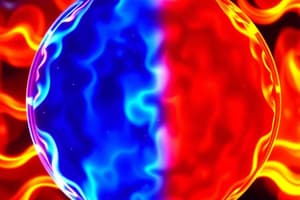Podcast
Questions and Answers
Match the scientific terms with their definitions:
Match the scientific terms with their definitions:
Kinetic Energy = It is the energy of motion, observable as the movement of an object or subatomic particle. Each moving object and particle has kinetic energy. Evaporation = It is a type of vaporization that occurs only on the surface of a liquid. Latent heat = This refers to the heat or energy that is being absorbed or released during the change of state/phase of a substance. Boiling point = The temperature at which the vapor pressure of a liquid is equal to the atmospheric pressure.
Match the process or concept to its description:
Match the process or concept to its description:
Kinetic Energy = The energy associated with the motion of objects. Evaporation = A process causing liquid to transform into gas at the surface. Latent heat = The heat required for a phase change of a substance. Boiling point = The phase transition temperature of a liquid under atmospheric pressure.
Match each scientific concept with its appropriate explanation:
Match each scientific concept with its appropriate explanation:
Kinetic Energy = Every moving object or particle possesses this energy. Evaporation = Unique to the surface of liquids. Latent heat = Heat that does not cause a temperature change during a phase change. Boiling point = Defined by the equivalence of vapor pressure and atmospheric pressure.
Match these scientific phenomena with their characteristics:
Match these scientific phenomena with their characteristics:
Match the following terms to their specific attributes:
Match the following terms to their specific attributes:
Flashcards are hidden until you start studying
Study Notes
Kinetic Energy
- Represents the energy of motion in objects and particles.
- Every moving object or subatomic particle possesses kinetic energy.
Evaporation
- A specific type of vaporization that exclusively occurs at the surface of a liquid.
- Involves molecules gaining enough energy to transition from liquid to gas.
Latent Heat
- Refers to the heat energy absorbed or released during a substance's phase change without a temperature change.
- Key in processes such as melting, freezing, boiling, and evaporation.
Boiling Point
- Defined as the temperature at which a liquid's vapor pressure becomes equal to the atmospheric pressure.
- Marks the transition from the liquid phase to the gas phase throughout the bulk of the liquid.
Studying That Suits You
Use AI to generate personalized quizzes and flashcards to suit your learning preferences.




